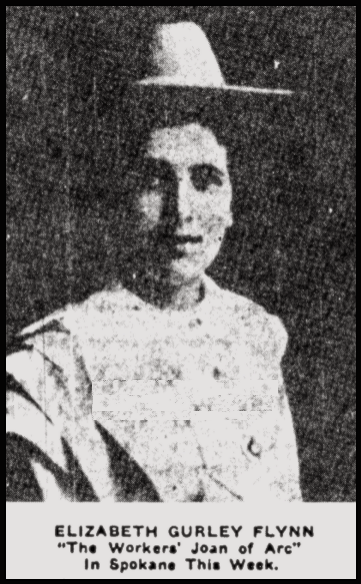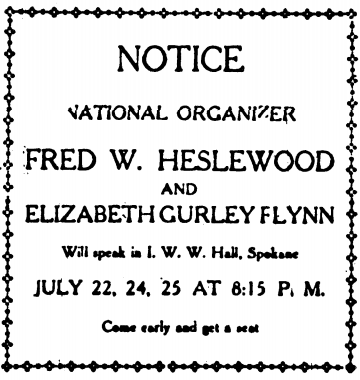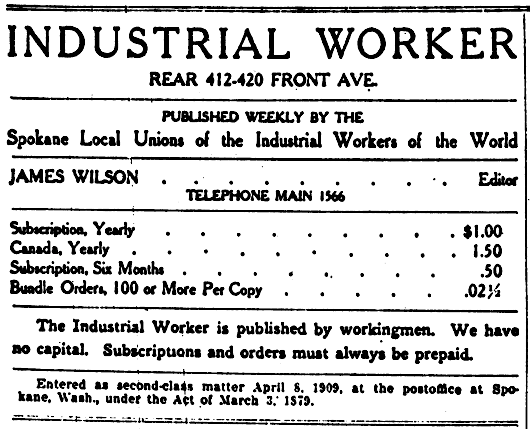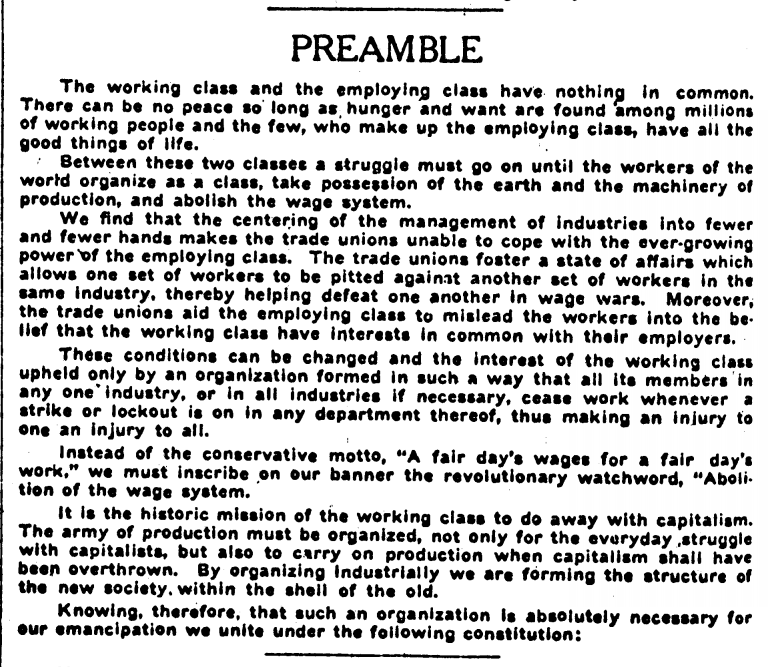 ———-
———-
Hellraisers Journal – Tuesday July 27, 1909
Spokane, Washington – June 29th Speech of Elizabeth Gurley Flynn, Part III
From the Spokane Industrial Worker of July 15, 1909:
ELIZABETH G. FLYNN ADDRESS TO WORKERS
—–(Concluded From Last Week)
Address of Miss Elizabeth Gurley Flynn, Organizer and Lecturer of the Industrial Workers of the World, given at Spokane, Wash., on Tuesday evening, June 29, 1909.
We had another strike, or contemplated strike, last spring in the coal mining district, the United Mine Workers of America-I was going to say one of the backbones of the America Federation of Labor, because it is like a jelly fish, it has lots of backbone! That organization had a convention in Scranton and they decided not to strike, though they were very anxious to get better conditions in the mines. A good mine contract expired in April. What kind of a time is that to strike? Who cares anything about coal in April The time for a coal mine to strike is very much the same time as the time for a hotel workers strike.
The strikers in Butte told me that they were dissatisfied with their wages, and they wanted more and they were going to wait until prosperity came back and then they were going to strike. Can’t you see them waiting? And I said, “The time for you to strike is next week when there will be a convention of the Fraternal Order of Eagles and the town will be filled with members and all the hotels will be on their good behaviour and the town of Butte trying to make a great show of their wealth and generosity; then would be the time to strike.” And can’t you see the hotel managers and the restaurant owners coming to time if the girls struck then? The time to strike is when you are most needed and when it hurts the boss most. (Applause.)
And the time for the coal miners to strike is in November, when everybody will freeze to death if the miners don’t keep getting out coal; but they waited until April and decided not to strike for the reason that the operators had coal that would last at least six months stock piled, and the miners had funds which, even at a starvation ration, would only last between four and five months; and so they could figure out that their strike was lost before it was ever begun. Now who piled up that coal? Was it the Baers that owned the mines? Oh, no; it was the miners whose delegates voted not to strike because the coal was there; these were the ones that stock piled it; and they themselves had laid up the weapons with which the company was in a position to absolutely defeat them. Now why did they do that?
The Sacred Contract.
Because in the states of Indiana, Illinois, Ohio and Pennsylvania., they have a contract which says that any miner who will in any way retard the production of coal shall be fined ten dollars, five of it to go to the union and five of it to the mine operators! And so, along about January, the operators started to hurray up and work overtime and the men are tied down by their contract and they can’t help themselves.
And let me tell you another clause of their contract-oh you fine American citizens who go to the “ballot box” on election day and cast their vote to say which body of thieves shall continue to rule over you! Now then, in the United Mine Workers of American they have another clause, which say that any miner coming under the jurisdiction of that contract, revokes his right to in any way further the interest of political parties seeking to change any existing mining laws or have new laws put on the statute books. That is another clause in their beautiful contract.
And then they have a system of collecting fines. The reason the Ziegler mine is, and has been an open mine today, is that Ziegler refuses to let his superintendent collect the union dues. They have a system by which you need no secretary, no paid walking delegate to go around and take up the money; they have a a system by which when you get your pay envelope you have so much checked off for powder, and so much checked off for union dues and the balance what is coming to you in wages. Think of a union that is so antagonistic to the interests of the boss that he is willing to collect dues for them! Think of the union that represents the interests of the workers so well that the boss forms himself secretary of the union!
It is very much like a case I heard of in Philadelphia, Penn., of a book binders’ union in which the boss was president of the union. The president of the union had the right to say when men should accept a lowering in wages, and so the boss lowered the wages and as president of the union told them they would have to take it; and they had no way of getting out if it and the last time I was in Philadelphia they were working for the lower wages. The United Mine Workers of America are not much better.
A system of unionism where you tie yourself down by contract to scab on yourself, being removed absolutely from the control of your own finances, is not a union at all; it is simply a gathering together of the laboring machines for the use of the master class-that is all.
The railroad workers are organized on the same system. The engineers and firemen work side by side in the cab of an engine, step outside that engine after working together for the master and work alone, each one separate and distinct from the other, when they are fighting their own battles; and all they ever come together about is to squabble as to who shall have jurisdiction. When the engineer goes out on a strike, the firemen will probably run the engine until they can get a scab engineer; when a fireman goes out on a strike the engineer must stay at work and teach, the scab fireman how to fire the engine; when the switchman goes out the engineer and fireman will carry the train over the road where the switches are switched by scab switchmen. One after another they may go out in their little 2×4 strikes but all the rest must stay at work-links in the chain that unite with the scabs and breaks the strikes.
Union Scabbery.
The Canadian Pacific road had a strike on, among the machinists and the engineers, the firemen, the conductors, the switchmen and section hands and telegraph operators all stayed at work and transported scabs from all roads of Canada and the United States to the end houses where the machinists were need deposited them right there, where they could break the strike. And then they called themselves union men.
Idled there by a strike on in the stock yards of Chicago, as there was among the butchers a few years ago-the teamsters eventually went out on a sympathetic strike-but all the refrigerator men stayed at work and kept the thousands of dollars’ worth of meat that was in the refrigerators away from the hands of the workers, and when scabs were put to work and took the scab product and kept that fresh so the union men might take hold of it and distribute it around throughout the country. It was not the scabs that broke the strike; it was the refrigerator men who were the key to the industrial situation at the time, who kept the property of the corporate class safe and thereby effectually broke the strike.
The strike is on among the longshoremen. You the teamster and railroad men, firemen and engineers, all stayed at work and brought goods in that broke the strike of the longshoremen. The teamsters bring it right to the wharf after it has been unloaded by the freight handlers, and carried from the different quarters of the continent by the railroad men; when it is delivered at the wharf after it has been loaded by scab longshoremen, it is sent across the water by union men, union firemen and union engineers.
Let there be a strike of the miners, and the lumber workers are organized separately, and they furnish the timber that is put in by scab miners; then the lumbermen go on strike, as they did at Somers, Montana, and the miners stay at work and put in scab lumber, and they evidently had no scruples against putting it in the mines.
Let the miners go out on a strike and the blacksmiths, tool repairers and electricians, all organized in the American Federation of Labor, and organized under a different contract system, stay at work, furnishing tools for scab miners, furnishing light for scab miners, furnishing power, repairs, everything needed that scab miners may continue without interruption the work dropped by the union miners.
Let the machinists go out and the boilermakers stay at work; let the weaver go out in the textile mill and the loom twisters and fixers stay at work; let the laster go out in the shoe factory, and every other worker stays at work; the clerk stays at work in the stores selling the product over the counter; the railroad men carry it, the teamster takes care of it, and every other laborer working thinks nothing of furnishing labor to the scab shoe factory. And all along the line, in every industry, you will find that we are organized not according to the way we work, not according to the commodity we produce, but according to the tool we used to use, according to the skill that we once had, the skill that is no longer necessary because a worker can transfer today from one industry to another and the standard of skill everywhere is so low that a miner can become a weaver, a weaver a miner if he has the strength.
We are organized according to a system which competition once caused capitalists to be afraid of the little individual craft union because he realized that every day he lost was a day gained by his competitors. But that system is no longer effectual today, because today every big industry is organized from the ground up in one gigantic trust and has no competitors worth speaking of-the United States Steel Corporation controls everything from the Mesaba iron range straight down the ore road, down the Great Lakes, through the smelter and mills and furnaces and finally the coal fields-all belong to the United States Steel Corporation-and then the finished product is distributed by means of the American Bridge Company and the different contractors.
—–
—–
———-
[Photographs, paragraph breaks and emphasis added.]
~~~~~~~~~~~~~~~~~~~~~~
SOURCES
Quote EGF, My Aim in Life, Spk Rv p7, July 8, 1909
https://www.newspapers.com/image/566226396/
Industrial Worker
(Spokane, Washington)
-July 15, 1909
https://www.marxists.org/history/usa/pubs/industrialworker/iw/v1n18-jul-15-1909-IW.pdf
IMAGES
-EGF, Spokane IW p3, July 22, 1909
-AD EGF Heslewood IWW Hall Spokane, IW p3, July 22, 1909
-Spokane IW, Editor James Wilson, IW p2, July 22, 1909
https://www.marxists.org/history/usa/pubs/industrialworker/iw/v1n19-jul-22-1909-IW.pdf
IWW Preamble, Spk IW p2, July 15, 1909
https://www.marxists.org/history/usa/pubs/industrialworker/iw/v1n18-jul-15-1909-IW.pdf
See also:
Category: Elizabeth Gurley Flynn
https://weneverforget.org/category/elizabeth-gurley-flynn/
Tag: EGF 1909
https://weneverforget.org/tag/egf-1909/
Hellraisers Journal – Saturday July 10, 1909
Speech of IWW Organizer Elizabeth Gurley Flynn at Spokane on June 29, 1909, Part I-From the Spokane Industrial Worker of July 8, 1909
Hellraisers Journal – Sunday July 11, 1909
Speech of IWW Organizer Elizabeth Gurley Flynn at Spokane on June 29, 1909, Part II-From the Spokane Industrial Worker of July 8, 1909
~~~~~~~~~~~~~~~~~~~~~~~~~~~~~~~~~~~~~~~~~~~~~
There is Power In The Union – Utah Phillips
Lyrics by Joe Hill




